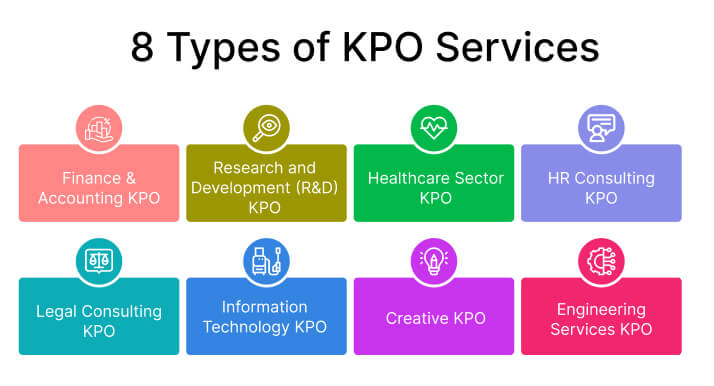A Deep Dive into Knowledge Process Outsourcing (KPO)
- January 16, 2024
- 10 mins read
- Listen

In 1959, Peter Drucker introduced the term “knowledge worker” in his book, The Landmarks of Tomorrow. Drucker characterized them as highly skilled workers who mastered their skills using theoretical and analytical training.
A 2023 survey by iHire found that 72% of recruiters are planning to increase their use of skills-based hiring methods. This shows the rising demand for knowledge-based workers in every industry. Even, companies like Unilever and IBM have successfully implemented knowledge-based hiring and reported positive results.
Now, the question is, how do all these companies manage to source their knowledge workers? There comes knowledge process outsourcing. KPO connects skilled individuals with skill demands beyond the geographic region.
What Is Knowledge Process Outsourcing (KPO)?
Knowledge process outsourcing is delegating complex, knowledge-based tasks to external service providers with a core focus on the subject matter. This may sound a bit similar to business process outsourcing. KPO and BPO both have third-party involvement as a similarity. However, KPO necessitates required individuals to have high skill or domain knowledge.
The sectors of this outsourcing type are diverse since almost every job can benefit from employees with high domain knowledge. Some common sectors of knowledge outsourcing are accounting, legal, healthcare, technical, and research.
Types of Knowledge Process Outsourcing Services
As we have said before, the sector is so diverse that it’s difficult to fit all the types within a box. Thus, we have selected a few high-demand types of KPO.

1. Finance & Accounting KPO
This involves outsourcing financial and accounting functions such as bookkeeping, tax preparation, auditing, and financial analysis to specialized service providers. The service provider must have expertise in the following field principles and regulations.
2. Research and Development (R&D) KPO
R&D projects are very uncertain. They often lack pre pre-determined roadmap that professionals can follow. It’s all you have to start from scratch. Preparing all the research materials and skilled employees often becomes a big challenge. A type of KPO involves outsourcing research-related activities such as market research, scientific research, and product development.
3. Healthcare Sector KPO
The healthcare sector goes beyond just treating patients. Many other tasks require an extensive skill set. Healthcare KPO involves outsourcing tasks related to healthcare information management, medical billing and coding, clinical research, and other specialized healthcare services. Additionally, the integration of advanced technologies in the industry has led to the development of healthcare chatbots, which play a crucial role in improving patient engagement, providing timely information, and enhancing overall healthcare communication.
4. HR Consulting KPO
HR functionalities have constantly evolving roles and responsibilities. With skilled HR consultants, companies can manage human resources with the best policies and practices. Outsourcing human resources functions includes recruitment, training, employee relations, and talent management. HR consulting KPO incorporates many HR technologies that improve your overall operations.
5. Legal Consulting KPO
Legal KPO offers cost-effective solutions to legal tasks. They connect you to skilled professionals, ensuring efficient handling of legal processes such as research, document review, and compliance. This approach allows organizations to tap into specialized legal expertise without the need for significant in-house investments.
6. Information Technology KPO
These tasks usually have high development costs. Some companies require a particular skill for only the short term. For example, you need an app developer to develop a CRM app. When the app is done, you will no longer need to keep this person working full-time. In such cases, outsourcing is a good solution. Tasks like data management, cybersecurity, cloud services, software maintenance, website development, and maintenance, etc,– you can outsource to an IT KPO.
7. Creative KPO
Creative knowledge process outsourcing involves creative services such as graphic design, content creation, video production, and other artistic endeavors. Creative KPO services leverage the expertise of professionals in design, multimedia, and content development. You no longer need to worry about getting day-to-day regular tasks done.
8. Engineering Services KPO
Companies that offer Engineering Services KPO should have expertise in different types of engineering, like mechanical, electrical, civil, and software. They often use advanced software tools and technologies to perform tasks efficiently. Whether it’s core or non-core tasks, KPOs bring the best skills within an affordable budget.
5 Key Benefits of Knowledge Process Outsourcing
According to Grand View Research, the global KPO market is expected to reach USD 33.07 billion by 2027, growing at a CAGR of 14.11% from 2022 to 2027.

It suggests that more companies will adopt KPOs due to their noteworthy underlying benefits. Some examples of these benefits are,
1. Get 10X Enhanced Productivity in Services
KPO companies are highly efficient with the core functions they provide. Imagine having the top talent performing on your given tasks. It will bring service excellence ten times more. In the meantime, you will have access to modern technologies that will boost productivity.
2. Access Global Talent Pool of Skills
Hiring skilled professionals in certain domains can be expensive, especially in developed countries. KPO providers, often operate in regions with lower labor costs. They can offer access to the same level of expertise at a more competitive price. Knowledge Outsourcing enables you to connect with a global talent pool and leverage their skills.
3. Save Subsequent Time From Hiring Hassel
Let’s say that you need a cybersecurity specialist to work with the firewalls of your system. The entire project will take 15 days. Will you spend months hiring someone for a 15-day project? I guess you won’t. Whether it’s short-term or long-term, recruitment is a time-consuming task. KPO agencies save this time by connecting you to on-demand talents without recruitment hassles.
4. Employee Turnover Risk Management
Employee turnover negatively impacts a company’s productivity. It’s even more challenging when it comes to the knowledge of employees. It may take you months to find your desired employee and then he leaves within a few months. KPO saves you from situations like this. KPO providers deal with the employees and under unwanted circumstances, they take full responsibility for finding replacements.
5. 24/7 Service Availability
Most KPO companies operate round the clock. Thus, you can keep the service operating 24/7 when it comes from a KPO agency. In an emergency, you can have your knowledge- employees work odd hours. This is highly beneficial for time-sensitive businesses.
Limitations of Knowledge Process Outsourcing
Just like every other sector, KPO too has some limitations. Once you know them, you will be able to incorporate pro-tips to make the limitations manageable.
1. Communication Barriers
One of the challenges in Knowledge Process Outsourcing (KPO) is the potential for communication barriers. The prospected employee may come from different languages, cultures, and time zones. They may need time to adapt to your company’s culture and politics.
Pro-tip: Arrange a training session while onboarding outsourced employees. Acknowledge and respect other’s perspectives.
2. Quality Control
By outsourcing, you allow some control over your processes to a third party. This can be concerning for tasks involving strategic decisions. It often takes longer times for outsourced employees to reach the expected quality.
Pro-tip: Prepare a service level agreement (SLA). Make sure that your outsourced employees have a clear vision of your business’s mission, vision, and expectations.
3. Data Security Risks
Data security is another major concern. Sharing sensitive data with a third party inherently carries security risks. Usually, reputed KPO providers assure you that your sensitive data will be safe with them.
Pro-tip: Ensure your KPO provider has robust data security measures in place, including encryption, access controls, and regular security audits.
Difference Between KPO and BPO (Comparison chart)
|
Comparison Basis |
KPO |
BPO |
|
Definition |
Knowledge process outsourcing defines sourcing unique skills that an organization requires from a third-party provider. |
Business process outsourcing defines sourcing organization tasks from a third-party provider. |
|
Service |
High-end services. |
Low-end services. |
|
Process |
The process of KPO requires an extensive understanding of business and the dedicated task. |
The process of BPO is simple since most of the tasks are repetitive simple requirement tasks. |
|
Complexity |
KPO tasks involve high-level complexity due to unique demands. |
BPO tasks comparatively take low to moderate levels of complexity. |
|
Qualification |
High domain knowledge. |
Non-core general knowledge. |
Who Manages KPO?
KPO management is a joint effort between the client and the KPO provider. The client organization wants to outsource knowledge-intensive business processes. They are in charge of defining project requirements and making sure they align with its business objectives.
The KPO service provider is responsible for hiring and managing skilled professionals, scaling up efficient processes, and delivering top-notch results. Both the client and service provider have project managers who oversee daily operations.
7 Best Practices for Implementing Knowledge Process Outsourcing

Now, if you are looking to adopt KPO, you must know the best practices. We’ve listed the seven best practices to streamline this for you.
- Plan Your Objectives and Expectations: Have you decided why you need to outsource the knowledge process? And, what do you expect from outsourcing? Before assigning your core task to a third-party agency, you must plan a set of objectives. Only then, you will be able to dedicate the tasks well.
- Robust Service Level Agreements (SLAs): A service level agreement is a contract between you and your KPO provider. SLA ensures that both of you have agreed on the service expectations and outcomes.
- Establish Clear Communication Channels: Since most of the KPOs operate remotely, you should establish clear communication channels. List down project management tools, employee communication tools, and all other platforms needed throughout the knowledge management.
- Imply Data Security Measures: Previously we’ve mentioned that data security is a concerning factor in outsourcing. Have a detailed talk with your service provider regarding the security measures they will be following.
- Organize Welcoming Onboarding: An outsourced employee might feel lost when assigned to a new company. A welcoming onboarding session will bring comfort. He/she will be more encouraged to bond with company culture.
- Transition Planning and Training: Knowledge employees are usually well-trained in their professional fields. They still need training to cope with organizational objectives. Prepare brief transition planning and training for your KPO employees. Introduce new employees to helpful systems like Vistacreate, Hubspor CRM, Jira, etc.
- Continuous Performance Monitoring: We are almost at the end. They have been onboarded, received training, and started their assigned jobs. The final stage is to monitor performance. Continuously monitor the performance of the employee. Communicate with the service provider if they miss meeting any KPIs.
End Note
Knowledge process outsourcing ( KPO ) helps to fill human resources gaps within a company. In the meantime, it introduces cost-effective and sustainable solutions. By leveraging KPO, any company can level up its existing skills. This is a highly effective work process model.




